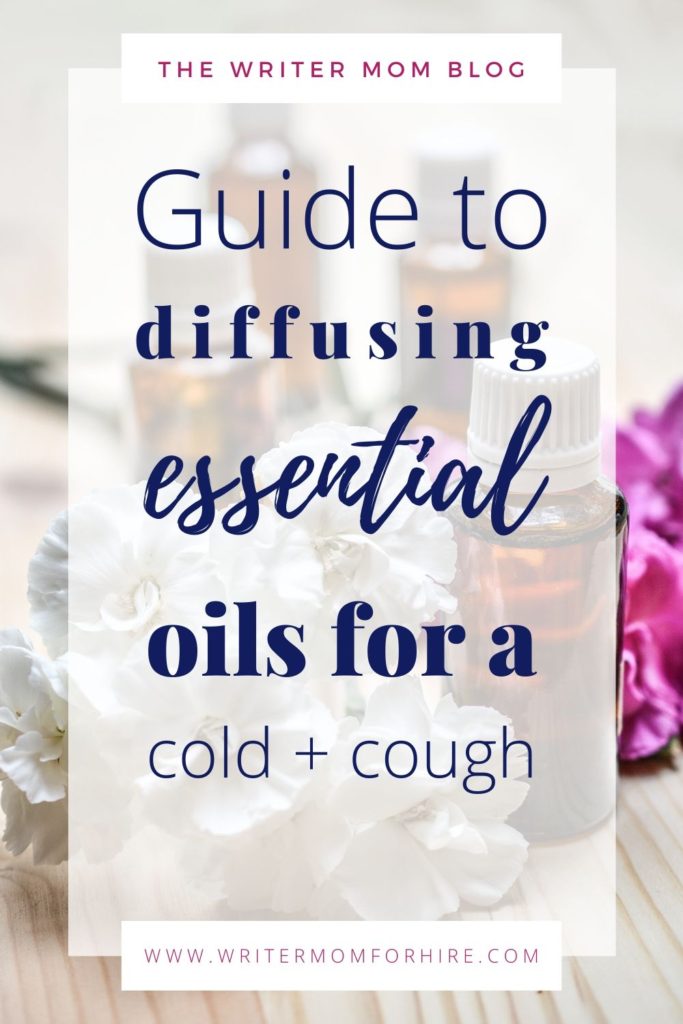Diffusing Essential Oils for Colds & Cough
This post may contain affiliate links and we may earn commissions when you make a purchase through these links (at no extra cost to you). See our disclosure policy for more details.
Types of Diffusers + Essential Oils for Colds to Diffuse
“Diffusing essential oils for colds (or a cough)? Does it really help?”
It starts as a tickle in your throat and gradually worsens until, finally, you can’t ignore it anymore. Nope, it’s not just allergies — it’s the dreaded cold.
If you’re anything like me, you probably avoid medicating as much as possible and deal with it while your body does all the hard work.
But that cough!
The cough that lingers for weeks after the rest of the cold symptoms have disappeared keeps you awake at night, wondering what you can do to make it stop — without resorting to over-the-counter cough syrup.
Wondering if diffusing essential oils actually works for colds or cough?
In this article, I’m going to go over the different types of diffusers, some helpful essential oils, and safety tips when it comes to diffusing around kids. But first of all….

Does Diffusing Essential Oils Actually Work for Colds?
There isn’t a lot of scientific research that supports the effectiveness of essential oils against the common cold.
However, some studies do support their use in alleviating the symptoms and boosting immunity, which can help the body fight off a cold.
For example, a 2010 study revealed that inhaling steam with chamomile essential oil can help relieve cold symptoms.
A separate study found that melaleuca oil (tea tree oil) has antiviral properties.
And yet another review confirmed that eucalyptus oil has antiviral and antimicrobial properties, which have been used to treat the common cold.
Its main component, 1,8 cineole, may be able to fight off viruses and respiratory problems like bronchitis.
Peppermint oil contains menthol, which is a natural decongestant and fever reducer, and can help to soothe sore throats and calm coughs brought on by the common cold.
Peppermint oil contains menthol, which is a natural decongestant and fever reducer, and can help to soothe sore throats and calm coughs brought on by the common cold.Click To TweetEssential oil diffusers disperse tiny molecules of oil into the air in a fine vapor or mist. The droplets then land on and are absorbed by the skin, or they enter the respiratory system via inhalation.
So, does diffusing essential oils actually work for colds?
Some essential oils can be beneficial in boosting the immune system, soothing a cough or sore throat, and alleviating congestion caused by a cold when droplets are absorbed into the body via the skin or respiratory system.
However, it’s important to take caution before diffusing essential oils around children, pets, or anyone with health conditions such as asthma. Certain oils can trigger an asthma attack or cause harm to your pets.
I will cover essential oil safety and kids a little later on in this post….
But first, let’s talk about the best essential oil diffuser for colds and cough.
What’s the Best Essential Oil Diffuser for Colds and Cough?
I am not a medical professional, and this information is not intended to replace medical advice.
There are a number of different methods you can use for treating cold symptoms, such as smelling the oils straight from the bottle or putting a few drops on a clean cloth and inhaling the scent.
Another method involves boiling water and creating a steam sauna:
- Place a few drops of your chosen essential oils in a pot of boiling water.
- Lean over the pot (without getting too close) and create a tent by putting a towel over your head.
- Close your eyes and breathe in the steam, coming up for fresh air every couple minutes.
Types of Aromatherapy Diffusers
Aromatherapy diffusers offer a less intense experience, but they can be used to disperse essential oils into the air over a longer period of time. Basically, you can set it and forget it (for a little while).
Ultrasonic: This type of diffuser uses small vibrations to release a fine mist of essential oils (diluted with water) into the air.
Heat: A heat diffuser heats up the oil, which causes it to evaporate into the room.
Fan/Evaporative: This diffuser uses a fan to move air across a wick or absorbent material containing the essential oil, and the oil evaporates into the air.
Nebulizing: A nebulizing diffuser uses cold, pressurized air to force undiluted oil molecules into an atomizer, breaking them down into fine particles and pumping them out into the air.
Choosing the Best Diffuser
With all the different options, which essential oil diffuser is the best?
I did a little digging and found that nebulizing and ultrasonic seem to be the most popular, but there are a couple factors to consider before making a decision.
Nebulizing diffusers ensure that you are only dispersing the purest form of essential oil to help you acquire the full benefits.
A nebulizing diffuser may be a good choice if you are using inhalation aromatherapy and you don’t have kids or pets around.
However, world-renowned researcher Robert Tisserand recommends using an ultrasonic diffuser if you have kids in the house.

Which Essential Oils Should I Diffuse for a Cold or Cough?
I mentioned a few different studies earlier in which chamomile, melaleuca, and eucalyptus oils were found to be helpful in fighting colds or alleviating cold symptoms, such as a cough and congestion.
These aren’t the only oils that could help you feel better, though.
Helpful Essential Oils for Colds to Diffuse
You might find it helpful to diffuse the following essential oils when you have a cold, even if they do nothing more than help you feel more comfortable while fighting it off.
- eucalyptus
- rosemary
- rosalina
- peppermint
- frankincense
- oregano
- thyme
- bergamot
- nutmeg
- cypress
- geranium
- cinnamon
- melaleuca (tea tree)
- chamomile
- lemon
- cedarwood
- fir needle
- fragonia
- juniper berry
- pine
- spruce
- sweet marjoram
- sweet orange
Essential Oils for Cough Diffuser Recipe Blends
In the past (before having kids), I have diffused a blend of peppermint, tea tree, and eucalyptus oils for their antibacterial and soothing properties.
There are a number of essential oils that have been pre-blended for your convenience, as well.
I found one on Amazon made by Plant Therapy called Germ Fighter, which is a blend of Lemon, Clove Bud, Eucalyptus Globulus, Cinnamon Cassia, Rosemary 1,8-Cineole.
It’s designed to support your immune system in fighting off germs, providing relief, and keeping you in good health.
Another one I found is called Respir Aid, a soothing, healing blend of Eucalyptus Globulus, Pine Scots, Peppermint, Lavender, Spruce Hemlock, Cypress, and Marjoram Sweet that will help clear congestion so you can breathe easier.
However, I must advise that you use some caution when diffusing any of the above oils (until you have researched their safety) if you have kids in the house. In the next section, I’ll go over some safety tips for diffusing essential oils around kids.
Which Essential Oils Can I Use to Treat a Kid’s Cough?
Let me start by saying that I rarely diffuse essential oils because I have kids, and I would rather err on the side of caution. However, I do believe that they have a place and time, even for those of us with kids in the house.
Essential Oil Safety Guidelines
1. Be sure to research the safety of each and every oil before diffusing it around children. There is a lot of contradictory information online about which essential oils are safe for kids, so carefully consider the source of your information.
2. Avoid diffusing around babies under three months old (Essential Oil Safety, pages 48-49).
3. Purchase good quality essential oils that are pure. In other words, they have not been mixed with another substance.
4. Store in a safe place. This may seem obvious, but keep bottles of essential oils out of their reach. Many of the essential oil poisoning incidents have occurred when children gained access to a bottle and ingested the contents.
5. Keep them out of direct sunlight and always use within date. This ensures the correct concentration and quality.
6. Be extra cautious if your child has asthma or breathing problems. Certainly consult with a professional first if your child has any known health concerns.
7. Always use a low dosage around children. Use no more than two or three drops diluted in water using an ultrasonic diffuser.
7. Additionally, limit diffusion to an hour at a time, and take 30-60 minute breaks in between.
8. Always keep your diffuser clean to prevent bacteria growth.
Safe Essential Oils to Treat a Kid’s Cough
So, which essential oils are safe to diffuse when treating your children’s cold, cough, or congestion?
I would be comfortable diffusing any of the following oils around my kids:
- frankincense
- bergamot
- tea tree
- cypress
- cinnamon leaf
- chamomile
- lemon
- cedarwood
- rosalina
- fir needle
- fragonia
- juniper berry
- pine
- spruce
- sweet marjoram
- sweet orange
Plant Therapy also has a kid-safe blend called Germ Destroyer, which is supposed to be as effective as Germ Fighter, but is safe to diffuse around children.
Essential Oil Wellness Toolkit
Here’s a recap of some of the recommended diffusers and essential oils to diffuse for a cold, cough, and congestion:
– Germ Destroyer (kid safe)








